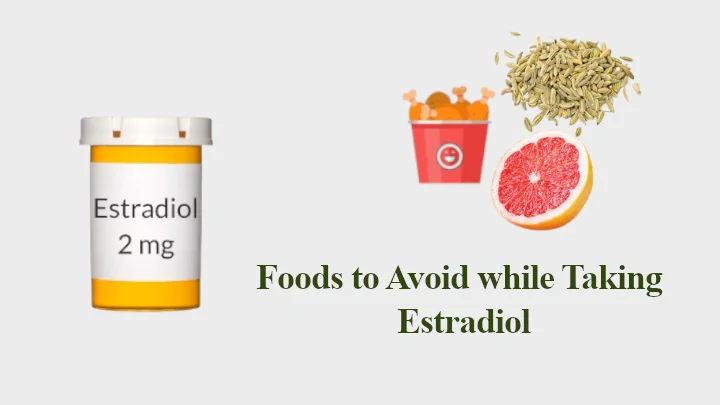11 Foods to Avoid while Taking Estradiol

Looking for foods to avoid while taking estradiol. It’s important to remember that if you’re undergoing estrogen hormone therapy with estradiol, maintaining a well-balanced diet is key for the effectiveness and safety of your treatment.
Estradiol is commonly prescribed to address various health conditions such as menopause symptoms, hormonal imbalances and transgender hormone therapy. However, it’s also important to be aware that estradiol can interact with certain foods in ways that could affect its absorption, metabolism and impact on the body. So make sure you eat healthy meals full of essential vitamins and minerals!
In this article we will discuss on foods to avoid while taking estradiol. It is essential to understand how certain food choices can affect the effectiveness of estradiol to maximize the advantages of hormone therapy while avoiding any possible risks.
In This Article
Foods to Avoid while Taking Estradiol
Here we have listed foods to avoid when taking estradiol
1. Grapefruit and Grapefruit Juice
Grapefruit and grapefruit juice contain compounds called furanocoumarins, which can inhibit an enzyme known as CYP3A4. This enzyme is responsible for breaking down many medications, including estradiol.
When this enzyme is inhibited by consuming grapefruit or its juice, it can lead to higher levels of estradiol in the bloodstream than intended – so be sure to check if you’re taking estradiol.
2. Soy-Based Products
I wanted to let you know that one should avoid soy-based products while taking estradiol. This is because soy contains compounds known as phytoestrogens which are plant-derived compounds that can mimic the effects of estrogen in the human body and thus interfere with the effects of estradiol. So it’s best to avoid these foods when taking this medication!
3. Flaxseeds
Estradiol foods to avoid are Flaxseeds. It’s important to avoid eating flaxseeds while taking estradiol. Flaxseeds contain compounds called lignans which are phytoestrogens.
Phytoestrogens have a similar chemical structure as estrogen and can interfere with the body’s natural estrogen receptors, so it’s best to steer clear of them if possible.
4. Dairy Products
Dairy products like whole milk, cheese, and butter contain naturally occurring hormones such as estrogen and progesterone, which can influence our hormone levels when we consume them. [source]
So it may be worth reducing your intake if you take estradiol or other hormone-related medications!
5. Licorice
Licorice is often recommended to be avoided or consumed in moderation when taking estradiol because it contains compounds called phytoestrogens.
These are plant-derived compounds that can mimic the effects of estrogen in the body, and since estradiol is a form of estrogen hormone prescribed for HRT, consuming additional sources like phytoestrogens from licorice may interfere with its effectiveness or cause unintended hormonal effects.
6. Fennel
Fennel has been used for centuries to aid digestion and reduce inflammation. But what’s interesting is that it contains phytoestrogens which can interact with estrogen receptors in our bodies and mimic some of the effects of estrogen! So Fennel-based products may interfere with the medication’s action or lead to unintended hormonal effects.
7. Alcohol
It’s important to know the potential interactions between alcohol and medications like estradiol. Excessive alcohol intake can lead to liver strain which could reduce its ability to process the medication efficiently.
Additionally, drinking too much may disrupt your hormonal balance and interfere with the intended effects of estradiol on your body.
8. Processed Foods
Remembering processed foods should be avoided or limited when taking estradiol is important. Eating a balanced and nutrient-rich diet is essential for supporting the therapy, as processed foods can contain artificial additives, preservatives, and synthetic chemicals, which may disrupt hormonal balance in the body.
9. Caffeinated Beverages
Caffeine stimulates the release of stress hormones like cortisol and adrenaline, which can impact other hormone levels in your body.
This includes estrogen (estradiol) and other hormones, so it’s important to keep track of how much caffeine you consume each day!
10. Processed Meats
We all love processed meats like bacon and salami, but it’s important to remember that they can be bad for our health.
Processed meats are often high in unhealthy saturated and trans fats, which can negatively affect heart health. For women taking estradiol, this is especially important as they may already have an increased risk of cardiovascular issues.
11. Sugary Foods and drinks
We all know that sugary foods and drinks can be delicious, but it’s important to remember that consuming too much of them can have a negative impact on our health.
High sugar intake may lead to hormonal imbalances, including insulin and other hormones that could interfere with the body’s natural hormone regulation.
Q. Do you take estradiol with food?
Ans- Yes, it is generally recommended to take estradiol with food. Estradiol medications are better absorbed when taken with food, as food in the stomach can help enhance their absorption and reduce the risk of gastrointestinal upset.
Q. Can you take estradiol with coffee?
Ans- It is generally advisable to avoid taking estradiol with coffee or any other beverages that contain caffeine. Caffeine can potentially interfere with the absorption and metabolism of estradiol, which could affect its effectiveness as a hormone therapy.
Conclusion
In conclusion, it’s essential to understand how our diet and medications may interact, especially regarding hormones like estradiol.
We’ve looked at various foods to avoid when taking estradiol because they all affect the hormone’s metabolism, absorption, and general effectiveness.
Be sure to read: Foods to Avoid while Taking Jardiance
References
- Effects of estradiol on food intake AND MEAL PATTERNS FOR DIETS
- Hormones in Dairy Foods and Their Impact on Public Health
- (PDF) Estradiol and appetite: To eat or not to eat





